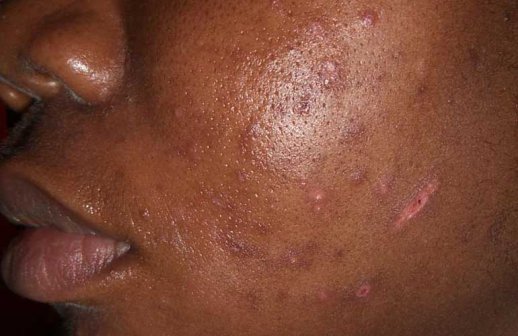 |
| Source: Standard Media |
Acne starts when the sebaceous glands overproduce oil, or sebum, that is secreted through the pores. Sebum carries dead cell debris but its over production blocks the pores with a sticky mass of oil and dead cells. When this happens, the bacteria in the skin converts the mass into compounds that irritate and rupture small glands, causing inflammation and unattractive pustules. Some people are predisposed to acne, but the most common causes are emotional stress and the increased activity of sex hormones (androgen).
These hormones stimulate the oil glands - typically on the face, shoulders, back and chest - and are especially active during puberty. Boys are more prone to acne than girls because they have higher androgen levels, but many girls also suffer, usually in the week before their period.
Research has suggested that many acne suffers are deficient in zinc. While burgers and chicken nuggets contain this mineral, healthier sources include shellfish, nuts, lean meat and skinless poultry. Yoghurt and skimmed milk supply zinc in smaller amounts.
Vitamin A, which helps to maintain a healthy skin, is abundant in liver and eggs, while beta carotene, which the body converts to Vitamin A, is found in dark green or orange vegetables such as spinach and carrots, and in orange fruits, including apricots and mangoes.
People with acne should ensure that their diet contains plenty of polyunsaturated fats, which counter acne. Several of the B vitamins, normally supplied by a well-balanced diet, prevent blackheads and leave the skin less greasy, while a lack of Vitamin C makes people vulnerable to infection. Vitamin E, found in wheatgerm, eggs, and cold-pressed vegetable oils, helps to heal the skin.


